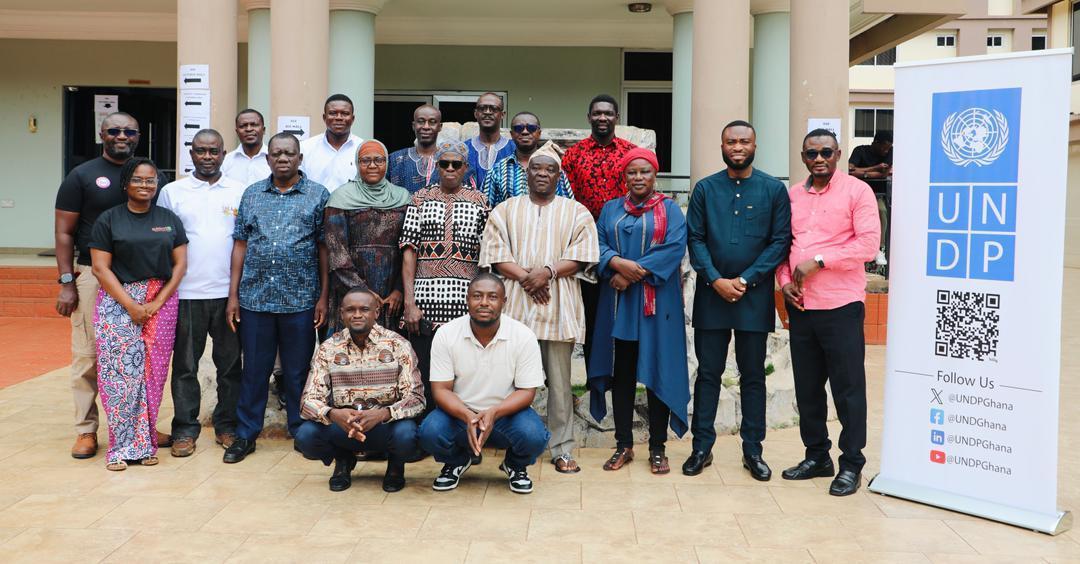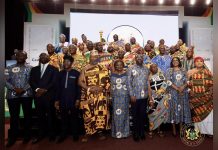Africa-Press – Ghana. The Ghana Shea Landscape Emission Reductions Project (GSLERP) is transforming the shea value chain and enhancing sustainable land management and climate resilience in Northern Ghana.
Funded by the Green Climate Fund (GCF), GSLERP is spearheading efforts to restore degraded lands, empower local communities, and strengthen the shea value chain, an essential economic and ecological asset in the Northern Savannah Zones.
The United Nations Development Programme (UNDP) Ghana, in collaboration with the Forestry Commission, the Tree Crops Development Authority (TCDA), and the Global Shea Alliance (GSA), is positioning shea as a cornerstone of green commodity development.
A recent milestone in this journey was the Validation Workshop of the National Shea Commodity Platform (NSCP), a pivotal event aimed at endorsing the NSCP framework, shaping its technical working groups, and planning the launch of the Shea Hub and platform.
The NSCP is envisioned as a regulatory and coordination body that will unify stakeholders across the shea value chain, from producers and processors to policymakers and financial institutions.
The platform aims to enhance governance, sustainability, and inclusivity in the shea sector, ensuring that all actors benefit equitably.
Importantly, the establishment of the NSC platform aligns with UNDP’s broader objective of strengthening multistakeholder collaboration using inclusive and participatory platforms, fostering shared ownership and collective action across the sector.
Speaking at the workshop, Mr Ayirebi Frimpong, Forest Specialist at UNDP Ghana, emphasised the importance of partnerships in driving progress and underscored the contribution of the GSLERP intervention to transforming rural lives.
“This activity reflects a key objective of the GSLERP project, leveraging a multistakeholder approach to strengthen the enabling environment for the shea sector. Such platforms are vital for managing green commodities and implementing landscape approaches that promote sustainable resource use,” he said.
Mr Rich Kofi Kofituo, the Deputy CEO of The Tree Crops Development Authority (TCDA), a key partner in the initiative, reiterated its commitment to creating a robust regulatory framework for Ghana’s strategic crops, including shea, coconut, cashew, oil palm, rubber, and mango.
“Realising the potential of these crops requires more than regulation it demands collaboration. We are committed to working with government agencies, NGOs, and financial institutions to actively develop the shea sector, ensuring that all stakeholders benefit fully,” he added.
During breakout sessions, stakeholders in the shea value chain took a close look at the proposed NSCP, reviewed each part of the platform, discussed its structure, raised concerns, and suggested improvements and their feedback helped shape a stronger, more effective platform that will guide the future of the shea industry.
A recurring theme throughout the workshop was the need to integrate young people into the shea industry.
Mr Adam Tampuri, a participant noted, “We need to ensure that young people are properly integrated into the shea industry. This will help them develop interest and commitment, so that when the older generation retires, the youth will be ready and equipped to take over and sustain the industry.”
The validation of the NSCP is a key step toward building a stronger and more inclusive shea industry in Ghana.
With continued support from GSLERP and its partners, the sector is set to grow in ways that protect the environment, support the economy, and uplift communities.
For More News And Analysis About Ghana Follow Africa-Press







